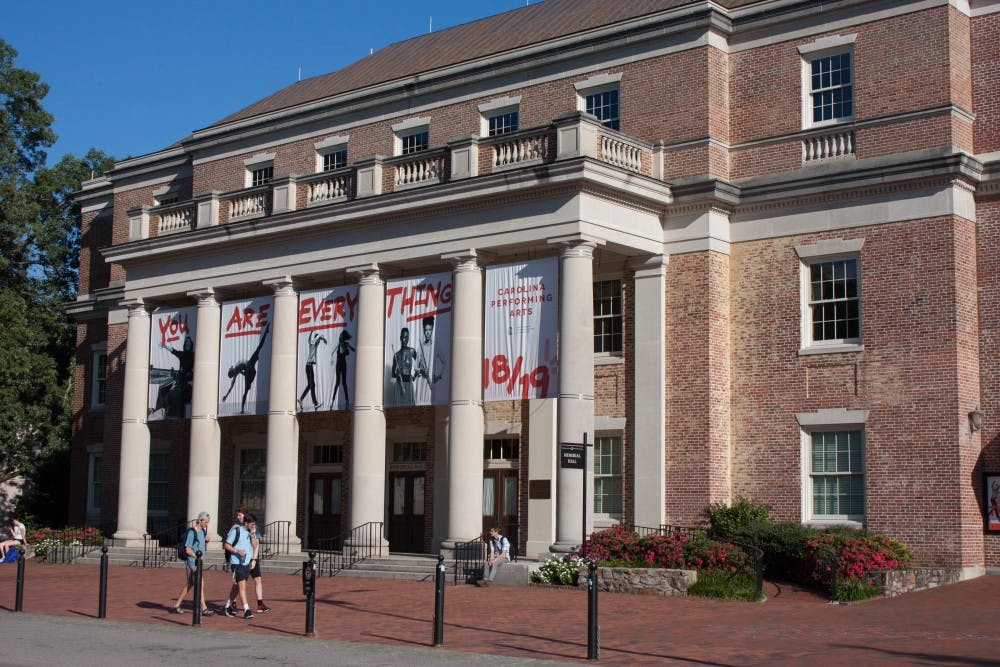MacPherson said the group was provided an alternate space in the Union Auditorium.
“The reason that we were kicked out of Genome an hour before our show was because nobody communicated that it was double-booked,” MacPherson said.
In a written statement from Victoria Boykin, the assistant director for event services at the Carolina Union, she said the University is working to create a shared scheduling system that will prevent double-bookings from occurring.
“We understand it takes a lot of time, effort and work to plan an event or performance,” Boykin said. “We work diligently to avoid scheduling conflicts and truly regret when they arise.”
Anoova Guthikonda, a dancer and the internal manager for UNC-CH Chalkaa, an Indian-American fusion dance team, said while the process to reserve spaces can be inefficient, the lack of designated spaces for performances or rehearsals is even more frustrating.
Alexis Payton, the secretary and treasurer for Kamikazi, a student hip-hop dance team, said it's difficult finding performance spaces on campus that accommodate the 40 plus person team.
Payton said Memorial Hall, one of the five Carolina Performing Arts venues, is the best space for Kamikazi’s size.
“But you know, if we don't get funding for that or we don't apply early enough in the season, then that gets booked really quickly,” Payton said.
If the team cannot book Memorial Hall, then they will rent out the Great Hall through Reserve Carolina, or the Stone Center Theatre through the Sonja Haynes Stone Center for Black Culture and History.
“The problem with those have been the small stages,” Payton said. “They also don't sit enough people. So then we've been known to sell our showcases easily within a few days.”
Marika O’Hara, the executive director of productions for UNC Pauper Players, a student theatre group, said finding venues to perform in over the past year has been very difficult.
In the past, unlike Kamikazi, O’Hara said the group has used Historic Playmakers Theatre, one of CPA’s venues, and the ArtsCenter in Carrboro for performances.
To get the day's news and headlines in your inbox each morning, sign up for our email newsletters.
But O’Hara said Historic Playmakers, along with a few other Carolina Performing Arts venues, was unavailable for the fall and spring semester— leaving the ArtsCenter as the group's only option for performances.
O’Hara said while Historic Playmakers costs can be steep — around $4,000 total for a Pauper Players performance that requires lighting, technical elements and other production aspects, and the daily $550 flat fee — it's more frustrating to not even have the option to pay that amount because the venue is unavailable.
Mike Johnson, the associate director for Carolina Performing Arts, said student groups get first priority for all venue rentals.
Johnson said the annual reservation process starts on April 1 each year for student groups and departments to reserve CPA spaces for the upcoming year.
However, Johnson said spaces like Memorial Hall and the CURRENT ArtSpace are very busy.
“So, it is harder to get dates in those spaces,” Johnson said.
Christina Rodriguez, associate director of marketing and communications at CPA, said they are discussing changing the reservation process to better accommodate student groups and the amount of reservation requests they receive.
"I think we're actually changing it a little bit this year so that there will be two reservation periods — one for the fall semester and one for the spring semester," Rodriguez said.
Johnson said he doesn't know if it's specifically Carolina Performing Arts' mission to create spaces for students because while CPA receives money from the University via student fees, that money has historically gone to supplementing the $10 tickets CPA offers to students for season performances.
Johnson said the fees received by the Union are specifically intended to offset costs of hosting student groups for their own performances, while the student fees CPA receives is not specifically to offset student groups.
“If you look at student affairs for the Carolina Union, they're getting student fees in particular for spaces for students,” Johnson said. “Our role is to bring arts experiences to campus.”
Rodriguez said CPA is the steward of a number of venues on campus—meaning that hosting rental events is part of its work— but CPA cannot state that its mission is to host student events, although CPA strives to support them in tangible ways and create space for them through that venue work.
She said CPA continues to support student organizations through giving priority to campus groups and giving student groups discounted rates over other applying organizations.
Payton said she wishes student groups in the future will have more of a voice when it comes to the creation of spaces for performance groups.
“I don't know who that seat would be with, whether it's the Union or people that are making those changes in the student rec center,” Payton said. “But, just having a seat at the table when it comes to discussions about the size of the spaces on campus and the performing venues that we can dance at.”
O’Hara said the university should put priority in creating a designated space for performance groups.
“If we don't have any space, the groups can't really exist,” she said.
arts@dailytarheel.com



